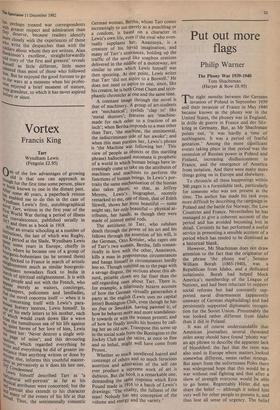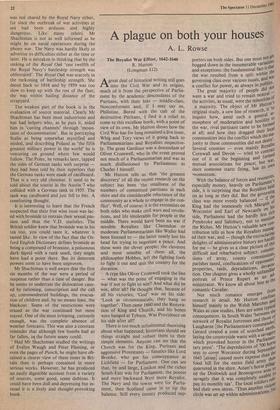Put out more flags
Philip Warner
The Phony War 1939-1940 Tom Shachtman (Harper & Row £8.95)
The eight months between the German invasion of Poland in September 1939 and their invasion of France in May 1940 became known as the phony war in the United States, the phoney war in England, la drole de guerre in France and der Sitz- krieg in Germany. But, as Mr Shachtman points out, 'it was hardly a time of nothingness. It was a period of fearful gestation.' Among the more significant events taking place in that period was the extension of Russian power in Poland and Finland, increasing disillusionment in France, and the emergence of America from isolation. And there were many more things going on in Europe and elsewhere.
To chronicle all these happenings within 300 pages is a formidable task, particularly for someone who was not present at the time. The author has made his task even more difficult by describing the campaign in Poland and the battle for Norway, the Low Countries and France. Nevertheless he has managed to give a coherent account of the period and has avoided becoming lost in detail. Certainly he has performed a useful service in presenting a sensible account of a period which has tended to be dismissed as a historical blank.
However, Mr Shachtman does not draw attention to the fact that the originator of the phrase 'the phony war', Senator William Borah (1865-1940), was a Republican from Idaho, and a dedicated isolationist. Borah had helped block America's membership of the League of Nations, and had been reluctant to support social reforms but had constantly sup- ported naval disarmament (apparently unaware of German shipbuilding) and had persistently supported diplomatic recogni- tion for the Soviet Union. Presumably the war looked rather different from Idaho than it did in Poland.
It was of course understandable that American journalists several thousand miles away should have found 'phony war' an apt phrase to describe the apparent lack of bloodshed: the fact that the term was also used in Europe where matters looked somewhat different, seems rather strange. But apart from the unfortunate Poles there was widespread hope that this would be a war without real fighting and that after a show of strength everyone would be able to go home. Regrettably Hitler did not share the belief — although it suited him very well for other people to possess it, and thus lose all sense of urgency. The belief was not shared by the Royal Navy either, for since the outbreak of war activities at sea had been arduous and highly dangerous. Like many others Mr Shachtman is not as well informed as he might be on naval operations during the phony war. The Navy was hardly likely to advertise its difficulties either at the time or later. He is mistaken in thinking that by the sinking of the Royal Oak 'one twelfth of the Royal Navy's battleship strength was obliterated'. The Royal Oak was scarcely in the reckoning of battleship strength. She dated back to 1916 and by 1939 was too slow to keep up with the rest of the fleet; she was within hailing distance of the scrapyard.
The weakest part of the book is in the evaluation of source material. Clearly Mr Shachtman has been most industrious and has had helpers who, as he puts it, aided him in 'cutting channels' through 'moun- tains of documentation'. But in portraying Stalin as being somewhat mystified and misled, and describing Poland as 'the fifth greatest military power in the world' he is venturing on ground where few would follow. The Poles, he remarks later, tapped the sides of German tanks with surprise — they had been told by their superiors that the German tanks were made of cardboard.
That is a very old chestnut. It used to be told about the tourist in the Austin 7 who collided with a German tank in 1935. The tank was cardboard and just fell to bits. A comforting thought.
It is interesting to learn that the French suspected that their free wine issue was lac- ed with bromide to restrain their sexual pas- sion and thus the V.D. statistics. The British soldier knew that bromide was in his tea too, you could taste it, whatever it tasted like. In view of the fact that the Ox- ford English Dictionary defines bromide as being a compound of bromine, a poisonous dark liquid with a rank smell, they might have had a point there. But its deterrent powers seem to have been unproven.
Mr Shachtman is well aware that the first six months of the war were a period of suspense rather than a time of danger. But he seems to underrate the dislocation caus- ed by rationing, conscription and the call up, commandeered buildings, the evacua- tion of children and, by no means least, the blackout. Some of the restrictions were erased as the war continued but most stayed. One of the most irritating, curiously enough, was the complete absence of weather forecasts. This was also a constant reminder that although few bombs had so far fallen, iq the future many could.
Had Mr Shachtman studied the writings of Evelyn Waugh and Peter Fleming, or even the pages of Punch, he might have ob- tained a clearer view of these times in Bri- tain than is perhaps contained in more serious works. However, he has produced an easily digestible account from a variety of sources, some good, some dubious. It could have been dull and depressing but in- stead it is a lively and thought-provoking book.











































 Previous page
Previous page